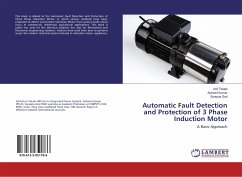
Ride-Through Fault Capability of Doubly-Fed Induction Wind Generators
Novel Control Strategies
Versandkostenfrei!
Versandfertig in 6-10 Tagen
55,99 €
inkl. MwSt.

PAYBACK Punkte
28 °P sammeln!
Due to the continuing growth of the installed power capacity of wind farms worldwide, the grid codes define specific requirements to the connection of wind turbines to the grid. One of these requirements is the ride-through fault capability (RTFC), that is, the equipment capability of continuing operating during voltage sags. This book presents the analysis of the behavior of the doubly-fed induction generator technology (DFIG) during balanced and unbalanced voltage sag and proposes novel control strategies to improve the RTFC. The system behavior analysis and the strategies validation are per...
Due to the continuing growth of the installed power capacity of wind farms worldwide, the grid codes define specific requirements to the connection of wind turbines to the grid. One of these requirements is the ride-through fault capability (RTFC), that is, the equipment capability of continuing operating during voltage sags. This book presents the analysis of the behavior of the doubly-fed induction generator technology (DFIG) during balanced and unbalanced voltage sag and proposes novel control strategies to improve the RTFC. The system behavior analysis and the strategies validation are performed using mathematical models in time and frequency domains, simulation results with a Simulink/Matlab model (2MW) and experimental results in two scaled test benches (4kW and 25kW). The limitations for the operation of the strategies are also analyzed. The main objectives of this work are to point the system weaknesses and to contribute to the study of low voltage ride-through strategies(LVRT) of the DFIG technology.












